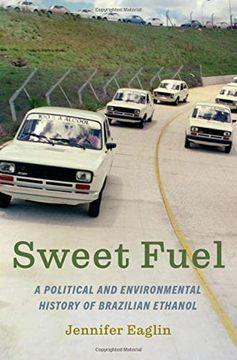Share
Sweet Fuel: A Political and Environmental History of Brazilian Ethanol (in English)
Jaime Eaglin Moore
(Author)
·
Oxford University Press, USA
· Hardcover
Sweet Fuel: A Political and Environmental History of Brazilian Ethanol (in English) - Eaglin
Choose the list to add your product or create one New List
✓ Product added successfully to the Wishlist.
Go to My WishlistsIt will be shipped from our warehouse between
Wednesday, June 12 and
Thursday, June 13.
You will receive it anywhere in United States between 1 and 3 business days after shipment.
Synopsis "Sweet Fuel: A Political and Environmental History of Brazilian Ethanol (in English)"
As the hazards of carbon emissions increase and governments around the world seek to reduce reliance on fossil fuels, the search for clean and affordable alternate energies has become an increasing priority in the twenty-first century. However, one nation has already been producing such afuel for almost a century: Brazil. Its sugarcane-based ethanol is the most efficient biofuel on the global fuel market, and the South American nation is the largest biofuel exporter in the world. Sweet Fuel offers the first full historical account of the industry's origins. The Brazilian government mandated a mixture of ethanol in the national fuel supply in the 1930s, and the success of the program led the military dictatorship to expand the industry and create the national programProálcool in 1975. Private businessmen, politicians, and national and international automobile manufacturers together leveraged national interests to support this program. By 1985, over 95% of all new cars in the country ran exclusively on ethanol, and, after consumers turned away from them whenoil was cheap, the government successfully promoted flex fuel cars instead. Yet, as Jennifer Eaglin shows, the industry's growth came with associated environmental and social costs in the form of water pollution from liquid waste generated during ethanol distillation and exploitative rural laborpractices that reshaped Brazil's countryside. By examining the shifting perceptions of the industry from a sugar byproduct to a national energy solution to a global clean energy option, Sweet Fuel ultimately reveals deeper truths about what a global large-scale transition away from fossil fuels might look like and challenges idealized views ofgreen industries.
- 0% (0)
- 0% (0)
- 0% (0)
- 0% (0)
- 0% (0)
All books in our catalog are Original.
The book is written in English.
The binding of this edition is Hardcover.
✓ Producto agregado correctamente al carro, Ir a Pagar.

